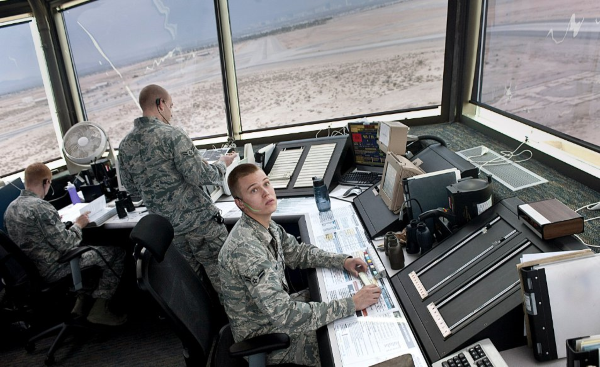If you are looking for an enlisted position that easily translates to well-paying employment in the civilian world, then being an Air Force Air Traffic Controller may be just right for you.
The responsibilities for this Air Force job assignment include:
- Controlling and regulating both in route aircraft and ground terminal air traffic
- Promote the orderly, safe and expeditious flow of air traffic under both visual and instrument controls by issuing advisories, instructions, and clearances
- Must have the ability to supervise and manage all aspects of air traffic control facilities
Keep in mind that this is a very demanding and stressful job at times that comes with much responsibility.
This is also a very rewarding Air Force specialty that comes with a lot of job satisfaction and has some other added perks too.
Jump To A Section
Air Force Air Traffic Controller Requirements and Qualifications
Enlisted personnel must pass all of the following testing, training, and other general requirements in order to become a working Air Traffic Control Specialist in the US Air Force.
Educational Requirements
- High School Diploma
- GED
- GED with 15 college credits
ASVAB Requirements
- Minimum ASVAB Score of 55 in the general category
Other Testing
- Must earn at the minimum a score of 55 on a 3-factor test model that includes ASVAB score, cognitive and personality testing (TAPAS) and an Air Traffic Control Scenarios Test
Additional Qualifications
- Be between the ages of 17 and 39
- Must be able to speak English very clearly and distinctly as demonstrated by Reading Aloud Test (RAT)
- Maintain all of the eye and other health requirements necessary for a ground-based air traffic controller
- Familiarity with air traffic control principles such as those gained in the Civil Air Patrol is desirable but not required
- Successful completion of 8.5 weeks of Air Force Basic Military Training held at Joint Base Lackland San Antonio, TX (Not required of those with prior military experience)
- Will be subjected to a current national agency check and local agency and credit checks
Air Force Air Traffic Controller Training and Career Path
Once an air traffic control candidate has successfully completed basic military training and met all of the other requirements that must be met by an Air Force Air Traffic Control candidate, they must proceed to technical training school.
Air Force Technical Training Information
The technical training school for Air Force Air Traffic Controllers is held at Keesler AFB outside of the city of Biloxi, Mississippi.
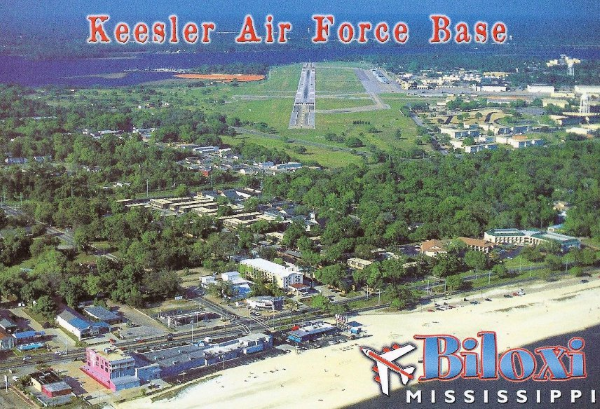
This Air Force technical school takes a little less than 3 months to complete.
This is a very demanding Air Force technical training course because of the amount of material that the enlisted member is expected to learn and maintain in a short period of time.
Once this training is complete the enlisted member will then proceed to their next duty assignment for several weeks of on the job training.
This next duty station will become known sometime during the middle of the technical training process.
On the Job Training
After completing technical training school, this Air Force AFAC also requires several weeks of hands-on job training.
The enlisted member will work side by side with a qualified Air Force Air Traffic Controller who will then groom them to do this demanding job alone.
There is no set time frame on this type of on the job training.
Obviously, an enlisted member must be able to proficiently handle all of the tasks assigned to them during this on the job training period.
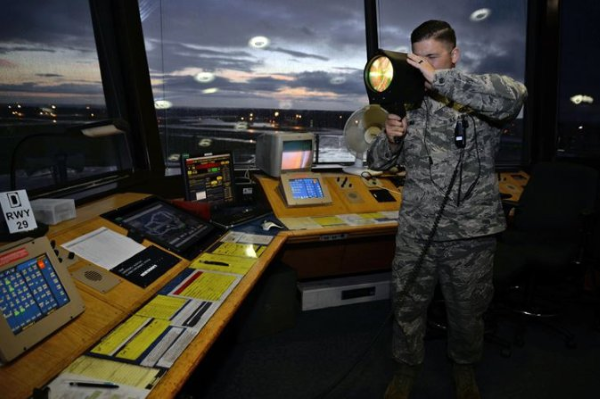
Until that happens, they will not be allowed to handle an air traffic control station on their own.
Upon successful completion of their technical training, an Airman will also receive college credits towards an Air Traffic Operations and Management degree.
Federal Aviation Administration Specialist Certificate
Not only must an Air Force Air Traffic Control candidate successfully complete all of the Air Force requirements for the position, but they also must meet certain FAA requirements too.
The candidate must be able to meet the testing and other requirements to be awarded a Federal Aviation Administration Specialist Certificate.
Any Air Force enlisted member aspiring to be an air traffic controller must possess this certificate before being allowed to assume the duties of a certified Air Force Air Traffic Controller.
How Much Are Air Force Air Traffic Controllers Paid?
There is no special pay for Air Force Air Traffic Controllers unless they have prior military experience or other relevant knowledge that they bring to the job.
That means in all likelihood they will start out at somewhere between an Airmen Basic (E-1) and Airman First Class (E-3) pay rate.
This pay rate is set for all enlisted members as determined by the Federal Government.
The current pay rates for E-1 to E-3 pay slots with less than 2-years military experience are as follows:
- Airman Basic (E-1): $1,680.83/Month
- Airman (E-2): $1,884.09/Month
- Airman First Class (E-3): $1,982.27/Month
This pay consists only of what is known as base pay.
Other pay incentives may include such things as basic housing allowance, food, temporary duty pay and active combat zone pay.
If one is interested to find out what they may receive for housing if they live off base they can use this handy BAH calculator:
Related Article – Basic Allowance For Housing (BAH) Calculator
There is a wide variety of additional benefits that an Air Force enlisted member is eligible for too.
The most important of these is that all of their health care is 100% paid for.
As a person rises in rank base pay all other types of pay will increase accordingly.
Rank advancement is done by combining time in service with a test score for the next rank that an enlisted member is trying to achieve.
The more time in a pay grade an enlisted member has, the lower the score necessary to advance to the next rank.
What’s Life Like as an Air Force Air Traffic Controller?
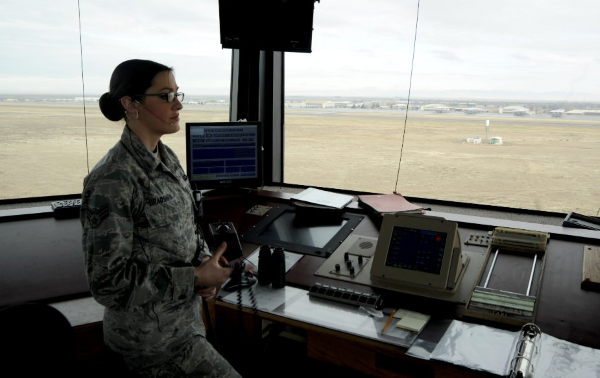
As long as an enlisted member can handle occasional night shift work, being an Air Force Air Traffic Controller affords that active duty service member a fairly routine lifestyle in peacetime.
They will be afforded a set schedule in most cases that include routine days off.
An Air Force Air Traffic Controller will also be able to take advantage of these opportunities during peacetime:
- The opportunity to participate in based sponsored sports and recreation
- The ability to take advantage of reduced price on base shopping facilities
- 30-days leave with pay each year
- Enlisted personnel are usually allowed to attend college courses in their off duty time in pursuit of a college degree
One has to keep in mind that as an Air Force Air Traffic Controller they can always be assigned to a temporary duty station or to an active combat zone as scenarios on the ground require.
There is also the possibility that an Air Force Air Traffic Controller could be stationed overseas.
Related Article: 15 Best States For Military Retirees And Veterans
This often times will allow an enlisted member to take in the sights of their host country and other countries around it.
Some remote duty stations abroad may not allow dependents or have facilities for them to live.
This can result in time away from one’s family.
Job Reviews
The reviews for this type of job in the Air Force are mostly positive.
Here is what a few Air Force enlisted members who served as an Air Traffic controller had to say about this job.
These and other Air Force Air Traffic Control reviews can be seen on this page at indeed.com.
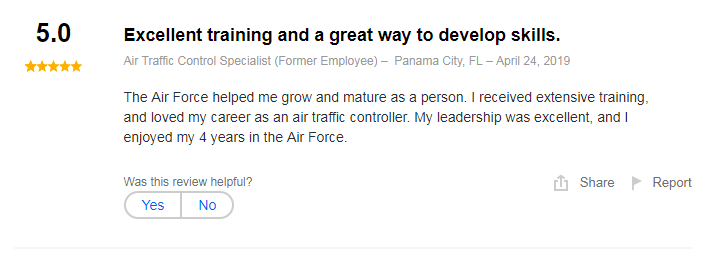
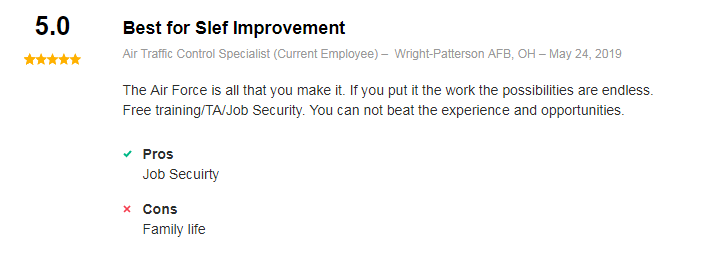
Civilian Career Opportunities for an Air Force Air Traffic Controller
There is one main job and several ancillary positions in the civilian world that being an Air Force Air Traffic Controller qualifies the prior enlisted member for.
This includes:
US Government Air Traffic Controller
When someone trains to be and serves as an air traffic controller they are grooming themselves to seamlessly transition into this same job as an Air Traffic Controller for the US Government.
Government Air Traffic Controllers do not get paid by the typical GS pay scale because of the stressful and demanding nature of their jobs.
Prior enlisted with 4-years plus in the military can expect to start out making around $70,000 per year as a US Government employed Air Traffic Controller.
The top-earning Air Traffic Controllers make over $150,000 per year.
Foreign Based Air traffic Control Positions
Air Force Air Traffic Controllers will also be eligible to apply for and get Air Traffic Control positions at many foreign airports too if they so desire.
Prior enlisted members with several years of experience in this field have a leg up on the competition because of their ability to speak English clearly.
English is currently the standard language used around the world for air traffic control operations.
Other Related Civilian Positions
Depending on their exact duties as an Air Force Air Traffic Controller, a prior enlisted member may also be eligible for other airport-related positions.
These include such jobs as:
- Airfield Operations
- Airfield Management
These types of positions usually start out at around $40,000 – $50,000 per year depending on if they are government or civilian contracted positions.
Federal Aviation Administration
There may also be opportunities for an ex-military member to gain employment with the FAA in several different capacities and pay ranges.
These positions may require extra schooling or cross-training to be eligible for them.
Related Article: Does The National Guard Pay For College?
References:
Official Aviation Resource Management Page
Air Force Reserve Official Page
- 5 Worst Jobs in the Air Force - June 20, 2024
- 4 Steps For Visiting An Air Force Recruiter Near You - June 19, 2024
- Air Force Safety Specialist (1S0X1) - June 19, 2024

